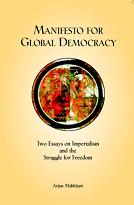
Apex Press, 2004 — 256 pages, paperback
Download the book as a PDF (19 MB) (Download is free, donations are welcome)
Order a copy of the book ($21.95) by contacting IEER or online via PayPal:
The U.S. ideology of Manifest Destiny, now at the core of the U.S. assertion of the right to intervene anywhere and occupy anyplace, in the name of freedom, security, and civilization, is akin to South African apartheid. The roots of this exclusionary and violent concept of freedom are explored in the first essay in the book, On Freedom and Equality, and contrasted with the universal idea of freedom, based on equality, espoused by Mahatma Gandhi and Rev. Martin Luther King, Jr. The borders between capitalist and developing countries separate people in the way Blacks and Whites in South Africa and in the United States were forcibly segregated not so long ago. An end to this global segregation is central to the struggle for global democracy and human rights.
The second essay, From Global Capitalism to Economic Justice, first published in 1992, gives a critique of global capitalism and the “end of history” thesis that western liberal democracy under global capitalism is the ultimate stage in human political and economic development. Going beyond a critique, it offers a vision that unites the benefits of individual and local initiatives and a more equitable distribution of wealth locally and globally.
Comments about On Freedom and Equality:
A vast number of words have been written about freedom. Both sides in countless struggles have appealed to it. If I had to pick one essay to inform action to resist the wars that are being waged in freedom’s name, like the War on Terror today, I would pick this brilliant piece of work by Arjun Makhijani, whose work I have admired for many years. It is indispensable reading in the struggle for global democracy.
— Daniel Ellsberg, author of Secrets: A Memoir of Vietnam and the Pentagon Papers
Comments about From Global Capitalism to Economic Justice:
One of the nation’s leading environmental scientists has now turned his considerable talents to economics. The result – a profoundly disturbing account of global capitalism – is compelling.
— Juliet B. Schor, Associate Professor of Economics and Head Tutor, Women’s Studies, Harvard University
A fine study of the world economy … the most convincing and comprehensive alternative assessment I know.
— Richard Falk, Visiting Distinguished Professor, Global Studies, University of California, Santa Barbara, and Milbank Professor of International Law, Emeritus, Princeton University